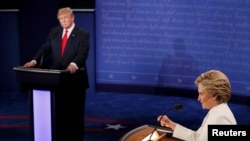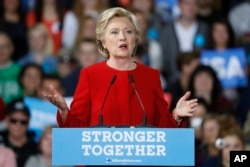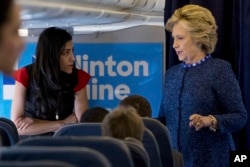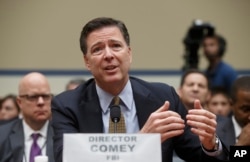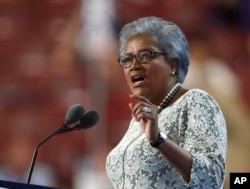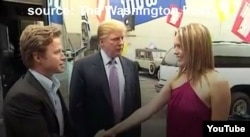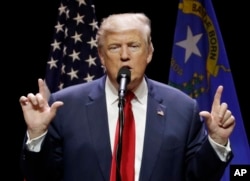It's no surprise a presidential campaign that's been anything but predictable enters its final week with the race tightening, following an October in which bombshell revelations about the two major candidates appeared to be the status quo.
Going into last week, Hillary Clinton held a comfortable lead in national polling and the momentum appeared to be in her favor. Enjoying a nearly six-point lead in the Real Clear Politics polling average, Clinton expanded her campaign operations in several historically Republican stronghold states like Texas and Arizona, as it looked like she was running away with the race.
But an FBI investigation, skyrocketing Obamacare premiums and a steady drip of stolen emails leaked by the open-government advocacy group WikiLeaks have left the Democrat's campaign scrambling as the election enters its final week.
The bad news began for Clinton Monday, October 21 when the Obama administration announced premiums for popular healthcare plans sold through its HealthCare.gov marketplace would rise by an average of 25 percent.
String of bad news
The news came as a blow to Clinton, who has run as an avid supporter of the landmark healthcare reform law signed by President Obama and vowed to defend and expand it should she take office.
Things got worse for Clinton on Friday, when FBI Director James Comey announced the discovery of thousands of emails potentially pertinent to an investigation into Clinton’s use of a private email server during her time as secretary of State. FBI agents found the emails on a computer shared by Clinton’s closest aide, Huma Abedin, and her estranged husband, former U.S. House Representative Anthony Weiner, during a separate investigation into alleged sexual messages sent by Weiner to a 15-year-old girl.
Almost immediately, Clinton pushed back against the FBI revelation, calling the timing of the announcement “unprecedented” and “deeply troubling.”
At a Saturday campaign appearance in Daytona Beach, Florida, Clinton told her audience, "It's pretty strange to put something like that out with such little information, right before an election."
Windfall for Trump
Trump, for his part, has seized on the FBI announcement, calling it a “big bombshell” and using it as a focal point during his rallies in recent days.
“It took a lot of guts for director Comey to make the move he made, in light of the kind of opposition he had, where they’re trying to protect her from criminal prosecution,” Trump said Monday during a rally in Grand Rapids, Michigan.
As a backdrop to all of this, the hacker group WikiLeaks has been steadily releasing stolen emails belonging to Clinton campaign Chairman John Podesta for the past two weeks, leading to embarrassing revelations and claims of espionage from those involved.
On October 24, WikiLeaks released a memo written by Doug Band, a top adviser to former President Bill Clinton, detailing how Band secured donations to the Clinton Foundation by leveraging Clinton’s status as an ex-president. While nothing Band wrote about was illegal, the revelation gave Trump more ammunition for his claims that Clinton is corrupt.
Another WikiLeaks dump on October 28 produced more evidence suggesting interim Democratic National Committee Chairwoman Donna Brazile helped Clinton during the primary debates by feeding her questions beforehand.
The hacked emails indicate Brazile, who at the time worked as a commentator on CNN, leaked a question to Clinton that she would later be asked at a CNN Democratic debate in Flint, Michigan in March. Previous emails released by WikiLeaks seem to show Brazile passing along another question prior to a CNN town hall event held later in March.
In response to the WikiLeaks revelations, CNN announced it would cut ties with Brazile because it felt “completely uncomfortable” with her apparent actions.
Brazile has repeatedly denied any wrongdoing and, in a statement, said she “never had access to questions and would never have shared them with candidates if I did.”
Trump recovers from tape scandal
Trump, meanwhile, has largely weathered a scandal that likely would have ended the candidacy of other nominees. In early October, a tape was leaked to the press on which the Republican candidate boasts about groping women and makes other lewd comments. In the immediate aftermath, Republican leaders denounced Trump and renounced their support for the GOP nominee.
Trump characterized the taped conversation as "locker room talk" and admitted he was "not proud" of what the microphone had captured him saying. Trump's situation worsened as several women came forward after the tape's release and accused him of some of the behavior Trump boasted about on the tape.
But while his poll numbers dipped, they didn't plummet, and in the last weeks of October he was making up some of the ground he lost to Clinton. And some Republicans who distanced themselves from Trump when the tape emerged were forced to temper their criticism of the candidate to avoid alienating the significant number of Republican voters still loyal to the nominee— and who demand similar loyalty from other candidates who need their votes.
More recently, media reports that Trump may not have made all the charitable contributions he's claimed in speeches, and suggestions that his tax returns (if he ever releases them) might not survive an IRS audit, have seemingly failed to deter those who want to see him elected — or at least don't want to see Clinton elected.
Neck-and-neck down the homestretch?
Recent polls — even though most were taken before the Clinton email revelations — see the popular vote tightening.
The ABC News/Washington Post tracking poll showed Clinton with a 12-point lead heading into October 24. By Monday, the lead was just one point. A similar daily tracking poll conducted by the Los Angeles Times showed Clinton leading Trump by just over two points going into October 24, but the same poll on Monday showed Trump with a 3.6 point advantage.
However, Trump still faces a steep challenge when looking at projections for the electoral college tally. And that, not the popular vote, will determine who becomes president.
The election forecasting site FiveThirtyEight.com still puts Clinton's chance of winning the election at about 75 percent, compared to Trump's 25 percent. That's due to Clinton's significant lead in most of the so-called swing states — those which historically aren't most often won by a single party. Trump must do much better than current polling suggest he will next week in order to win the presidency.




